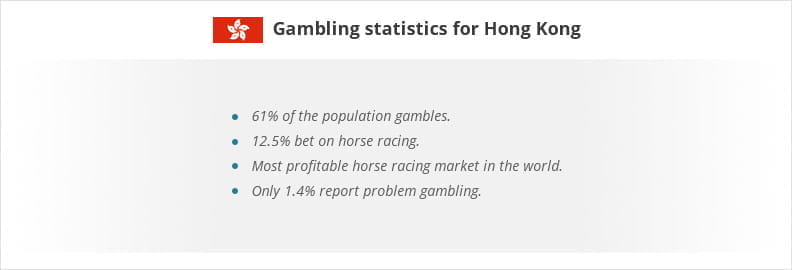


Golden goddess slot machine big winner. According to section 2 of the Gambling Ordinance (Cap. 148) (the 'Ordinance'), 'gaming' means the playing of or at any game for winnings in money or other property whether or not any person playing the game is at risk of losing any money or other property.
'Game' means a game of chance and a game of chance and skill combined and a pretended game of chance or chance and skill combined, and also means any game whatever in which - (a) a bank is kept by one or more of the players exclusively of the others; or (b) the chances of the game are not equally favourable to all the players, including among the players, the banker or other person by whom the game is managed or against whom the players stake, play or bet.
Gambling Licence Hong Kong Tourist
Hong Kong has charities which have a goal to promoting responsible gambling practices among those who gamble and to minimizing the negative effects of problem gambling. Such charities also look for a balance between meeting the demand for gambling and maximizing the social and economic benefits of gambling for the community, while helping to. At present, such authorized gambling outlets include horse racing organized by the Hong Kong Jockey Club, the Mark Six Lottery, authorized football betting and gaming activities authorized by the public officer appointed by the Secretary for Home Affairs under the Gambling Ordinance (Cap. Mahjong parlours).
Under section 3 of the Ordinance, if the game is a game of amusement with prizes, the organisation and conduct of which should obtain an AWPL; otherwise, the concerned gaming event is unlawful.
(1) Claw Machine
Gambling License Hong Kong
A typical claw machine allows a customer to attempt to obtain an item available in the machine by a mechanical claw upon payment. Regardless of whether the customer can obtain an item from the machine, the game will end when the specified time is reached. It is uncertain whether a customer will obtain an item from the machine upon payment and the monetary value of the items available in the machine is significantly higher than the payment by the customer. Hence, the attempt to obtain an item from the claw machine may constitute 'gaming'. The operation of such machine is therefore regulated by the Ordinance and an AWPL is required.
(2) Toy Capsule Machine
A typical toy capsule machine will randomly dispense an item upon payment. A customer will be clearly informed of the type(s) of items available in that particular machine, and the monetary values of items available in the machine are largely the same (e.g. same type of product but in different colors) and unlikely to exceed the payment by a customer. In such circumstances, the operation of such machine, which is similar to other common means of selling products, would generally not constitute 'gaming'. An AWPL is therefore not required.
However, if the monetary value of some items inside the toy capsule machine is significantly higher than that of the other items, obtaining an item from such machine may constitute 'gaming'. The operation of such machine is regulated by the Ordinance and hence an AWPL is required.
Whether the business operation modes of claw machine and toy capsule machines may constitute 'gaming', and hence require an AWPL will be determined on the actual game method or operation mode of such machines. The above examples are for general reference only.
